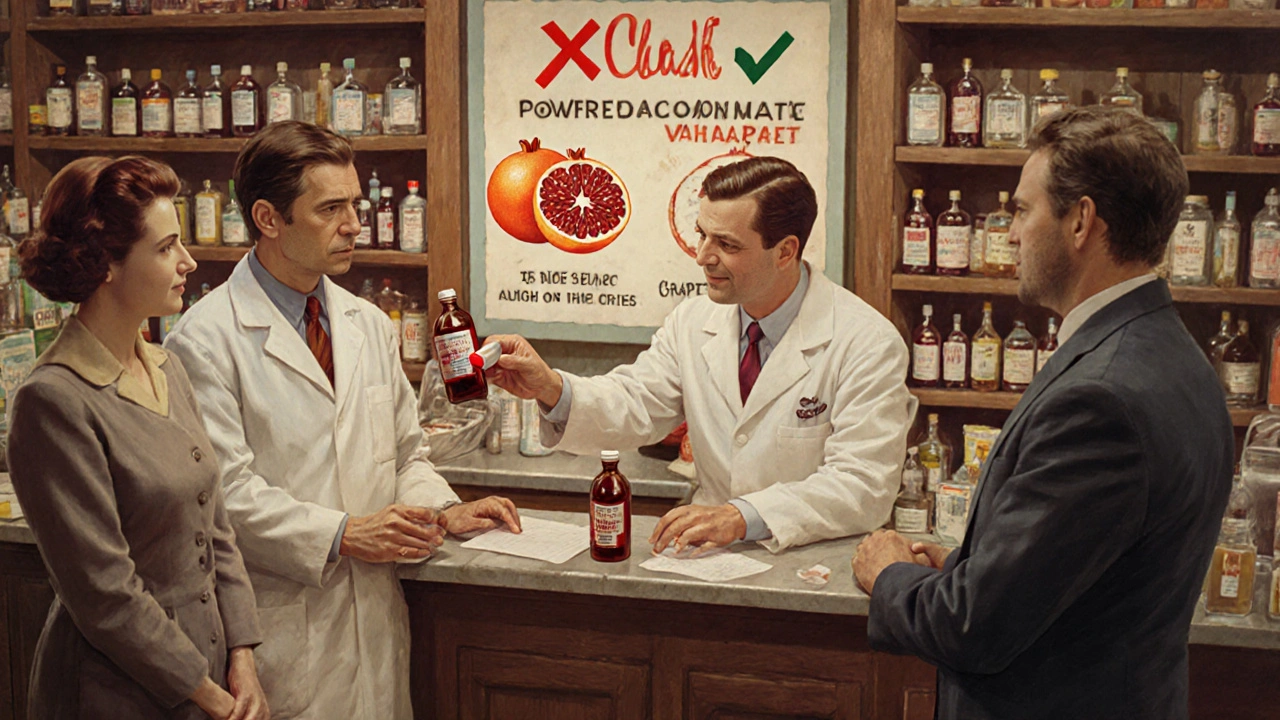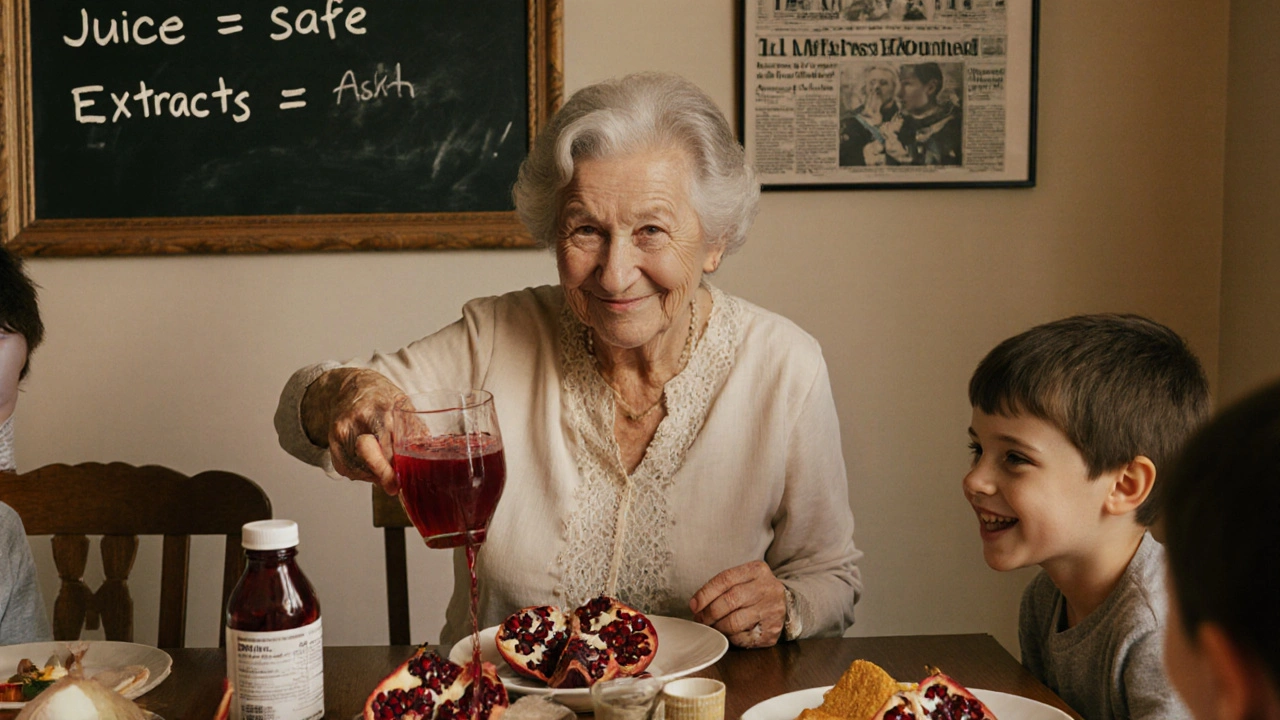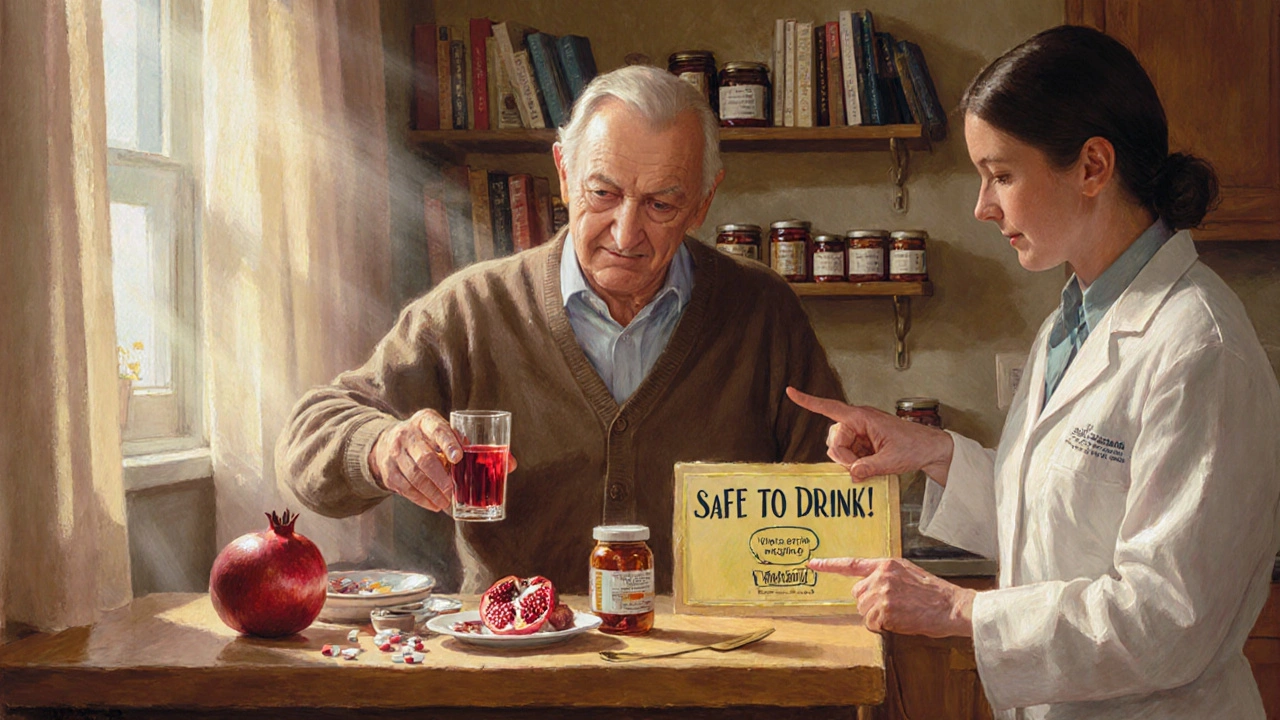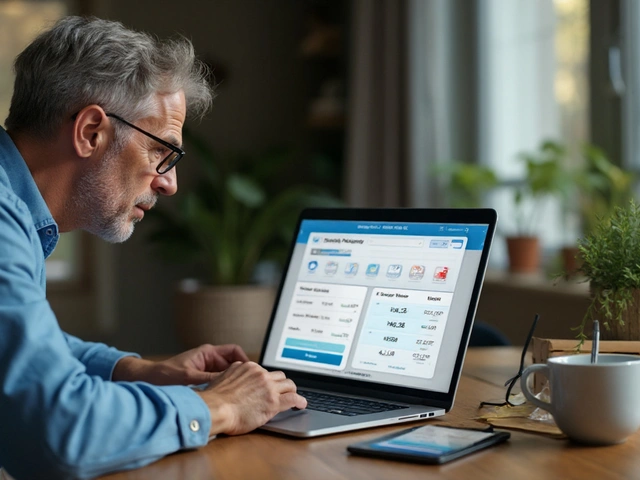Pomegranate Juice Medication Interaction Checker
Medication Interaction Checker
Many people drink pomegranate juice for its antioxidants and sweet-tart flavor. But if you're on medication, you’ve probably heard warnings about grapefruit juice - and now you’re wondering: pomegranate juice might be just as risky. The truth? It’s not. Despite what early lab studies suggested, real-world evidence shows pomegranate juice doesn’t interact with medications the way grapefruit juice does.
Why the Confusion Started
Back in 2005, a lab study from Japan made headlines. Researchers found that pomegranate juice, in test tubes, blocked the same enzyme - CYP3A4 - that grapefruit juice does. This enzyme breaks down about half of all prescription drugs in your gut. If it’s blocked, drug levels can spike dangerously high. The results looked alarming. Pomegranate juice seemed to inhibit CYP3A4 just as strongly as grapefruit juice. Suddenly, pharmacies and websites started adding pomegranate to the list of foods to avoid with medications. But here’s the catch: test tubes aren’t people.What Happened When Real People Drank It
Between 2007 and 2013, multiple clinical trials tested pomegranate juice in actual patients. One study gave people daily pomegranate juice for a week, then measured how their bodies handled midazolam - a drug that’s extremely sensitive to CYP3A4 inhibition. The result? No change in drug levels. Another trial looked at flurbiprofen, a painkiller processed by CYP2C9. Again, no effect. The geometric mean ratios for both AUC and peak concentration were almost exactly 1.0 - meaning the drug behaved the same with or without juice. That’s not a small difference. That’s no difference. Grapefruit juice, by contrast, can boost the blood levels of drugs like felodipine by more than 300%. It’s a proven, dangerous interaction. Pomegranate juice? Nothing like it.Why the Lab Results Don’t Match Real Life
The reason pomegranate juice doesn’t cause problems in people comes down to concentration and absorption. In the lab, researchers use pure, concentrated extracts. In your body, the juice gets diluted, and the compounds that might inhibit enzymes are poorly absorbed. Your gut doesn’t absorb enough of them to make a difference. Grapefruit juice, on the other hand, contains furanocoumarins - chemicals that stick to CYP3A4 in your intestinal wall and permanently disable it. One glass can knock out the enzyme for up to 72 hours. Pomegranate juice doesn’t have these chemicals. It has punicalagins and ellagic acid - powerful antioxidants, but not enzyme killers.
What About Warfarin? The Big Fear
Warfarin is a blood thinner with a narrow safety window. Even small changes in its level can cause bleeding or clots. It’s metabolized by CYP2C9. So naturally, people worried: if pomegranate juice blocks CYP2C9, could it make warfarin too strong? A few case reports floated the idea. One 2017 report described a patient whose INR jumped after starting pomegranate extract. But here’s the fine print: it was an extract, not juice. Extracts are concentrated, sometimes made from skins and seeds - the parts of the fruit with the highest levels of active compounds. Juice? It’s mostly water and sugar, with very little of those compounds. Real-world evidence tells a different story. On Reddit’s r/Pharmacy, 42 out of 47 pharmacists said they never tell patients to avoid pomegranate juice. One pharmacist with 12 years of experience said, “I’ve had several cases where grapefruit juice spiked INR with warfarin. I’ve never seen it with pomegranate.” Another patient on Drugs.com reported drinking pomegranate juice daily for six months while on warfarin - with stable INR readings between 2.0 and 2.5. No issues.What Experts Say Now
Dr. Stephen M. Stahl, a leading psychopharmacologist, put it bluntly: “The risk of a pharmacokinetic interaction is negligible if pomegranate juice is consumed by patients receiving CYP2C9 substrates.” The American Society for Clinical Pharmacology and Therapeutics issued a clear position in 2015: pomegranate juice does not require avoidance with CYP3A4 or CYP2C9 substrate drugs. Even the FDA doesn’t list pomegranate juice as a drug interaction risk. Their database includes grapefruit juice - and 85 medications with clear warnings - but pomegranate juice? Not a mention.What About Supplements?
This is where things get tricky. Pomegranate extracts, capsules, powders, and concentrated supplements are not the same as juice. These products can contain 10 to 100 times more active compounds. There’s less data here - and that’s why some experts, like Dr. Paul Watkins, say we can’t completely rule out risk with these forms. If you’re on a medication with a narrow therapeutic index - like cyclosporine, tacrolimus, or certain anti-seizure drugs - stick to juice. Avoid extracts unless your doctor or pharmacist has reviewed the product and confirmed safety.
What Should You Do?
Here’s the practical guide:- Drink pomegranate juice? Go ahead. No need to stop if you’re on statins, blood pressure meds, antidepressants, or blood thinners.
- Take pomegranate supplements? Talk to your pharmacist. These are different. They’re not regulated like food. The dose and composition can vary wildly.
- Still worried? Ask for a blood test. If you’re on warfarin or another drug where levels matter, your INR or drug level can be checked before and after starting juice. Most of the time, you’ll see no change.
- Don’t confuse it with grapefruit. Grapefruit juice? Avoid it. Period. Pomegranate juice? Not a problem.
Why This Misinformation Persists
A 2016 survey found that 68% of physicians still believed pomegranate juice needed the same warnings as grapefruit juice. That’s not because the science is unclear - it’s because the early lab studies were loud, simple, and scary. They made good headlines. The follow-up clinical trials? Less flashy. They didn’t go viral. Meanwhile, the pomegranate juice market is booming - worth over $2 billion in 2023. If every bottle came with a warning label, sales would drop. But no regulatory agency has issued one. Why? Because the data doesn’t support it.The Bottom Line
Pomegranate juice is safe to drink with most medications. The lab studies that scared people were misleading. Real human data says otherwise. You don’t need to give it up for your blood pressure pills, cholesterol meds, or even warfarin. But don’t assume all pomegranate products are the same. Juice? Fine. Extracts, capsules, powders? Proceed with caution - and ask your pharmacist. If you’re on a medication that requires tight control, the best advice is simple: keep drinking your juice. Just don’t skip your blood tests. And if you ever switch from juice to a supplement - talk to your provider first.Can I drink pomegranate juice with my blood pressure medication?
Yes. Clinical studies show pomegranate juice does not affect blood pressure medications like amlodipine, lisinopril, or losartan. Unlike grapefruit juice, it doesn’t interfere with CYP3A4 in a way that raises drug levels in your blood. You can safely enjoy it with your meds.
Is pomegranate juice safe with warfarin (Coumadin)?
Yes, based on current evidence. Multiple human studies and real-world reports show no significant effect on INR levels when drinking pomegranate juice. However, avoid concentrated pomegranate extracts - these may contain higher levels of compounds that could theoretically interact. Stick to juice and monitor your INR as usual.
Does pomegranate juice interact with statins like atorvastatin?
No. Unlike grapefruit juice, which can dangerously raise statin levels and cause muscle damage, pomegranate juice has been tested with atorvastatin and simvastatin in human trials. No changes in drug concentration were found. You can drink it without concern.
Why do some websites still warn about pomegranate juice?
Many websites still list it as a risk because of early lab studies from 2005 that showed strong enzyme inhibition in test tubes. But those results don’t translate to people. Clinical trials since then - involving hundreds of patients - show no real interaction. The misinformation persists because it’s easier to repeat a warning than to update outdated content.
Should I avoid pomegranate juice if I’m on multiple medications?
No, not if you’re drinking the juice. Even if you’re on several drugs metabolized by CYP3A4 or CYP2C9, human studies show pomegranate juice doesn’t raise their levels. The only exception is if you’re taking concentrated pomegranate supplements - those should be reviewed by your pharmacist. Juice? It’s fine.
What’s the difference between pomegranate juice and pomegranate extract?
Juice is made from the arils (seeds and pulp) and is mostly water, sugar, and antioxidants. Extracts are concentrated powders or capsules made from skins, seeds, or whole fruit - often with much higher levels of compounds like punicalagins. While juice is safe, extracts may pose theoretical risks, especially with narrow-therapeutic-index drugs. Always check labels and talk to your pharmacist before taking extracts.







Malia Blom
7 November 2025Okay but let’s be real - if you’re still scared of pomegranate juice because of a 2005 test tube study, you’re living in a lab report. Real humans drink this stuff daily. I’ve been on statins for 8 years and drink a glass every morning. My liver enzymes? Fine. My INR? Stable. The fear is just outdated noise dressed up as science. 🤷♀️
Erika Puhan
8 November 2025While the clinical data appears to demonstrate negligible pharmacokinetic interference vis-à-vis CYP3A4 and CYP2C9 substrates, one must still consider the heterogeneity of bioavailability profiles across commercial juice formulations. The absence of FDA labeling does not equate to biological irrelevance - particularly in polypharmacy cohorts with compromised hepatic metabolism. The burden of proof remains on the consumer to validate individual metabolic response.
Edward Weaver
9 November 2025USA has the best science, and we’ve done the real studies. These European and Indian blogs still pushing ‘pomegranate = grapefruit’ nonsense are just lazy. We’ve got double-blind trials, we’ve got peer-reviewed papers, we’ve got pharmacists who’ve seen thousands of patients. If you’re still scared, maybe don’t drink juice - just take your meds and shut up.
Lexi Brinkley
11 November 2025OMG I’ve been drinking this with my blood pressure meds for YEARS and I’m still alive 😭❤️🔥 no cap, pomegranate juice is my favorite part of breakfast. if you’re scared, just ask your pharmacist. they’ll laugh at you. 🍉✨
Kelsey Veg
12 November 2025wait so u mean to tell me i dont have to stop drinkin pomegranate juice w my cipralex?? omg i thought i was gonna die. i been drinkin it since 2020. my dr never said nothin. maybe they dont even know? 😅
Alex Harrison
13 November 2025Just wanted to add - I’m on warfarin and have been drinking pomegranate juice for over a year now. My INR has stayed between 2.1 and 2.4 the whole time. I even switched brands once, no change. I think the real danger is when people confuse juice with supplements. Those things are basically concentrated pills. Juice? Just fruit water. No big deal.
Jay Wallace
14 November 2025Let’s not be naive. The FDA doesn’t regulate food. That’s not a stamp of approval - it’s bureaucratic inertia. The fact that 68% of physicians still believe this is a risk? That’s not ignorance - that’s caution. You think your anecdote about your morning smoothie overrides decades of clinical pharmacology training? Please. The burden of proof isn’t on the medical community to disprove every fruit juice fantasy - it’s on you to prove your behavior won’t kill you. And you haven’t.
Alyssa Fisher
15 November 2025It’s fascinating how science gets distorted by narrative. The 2005 study wasn’t wrong - it was incomplete. Lab results aren’t lies, they’re just contextless. Real human physiology is messy, adaptive, and beautifully resistant to oversimplification. Pomegranate juice is full of compounds that *look* dangerous on paper - but your body doesn’t absorb them the way a test tube does. It’s not that the juice is safe because science says so - it’s that biology is smarter than our assumptions. And that’s why we need to stop treating medicine like a checklist and start treating it like a conversation with your own body. Drink the juice. But also, listen to your lab results. And if you’re taking extracts? Yeah, talk to your pharmacist. Because supplements aren’t food. They’re unregulated chemistry. And that’s the real conversation we’re avoiding.